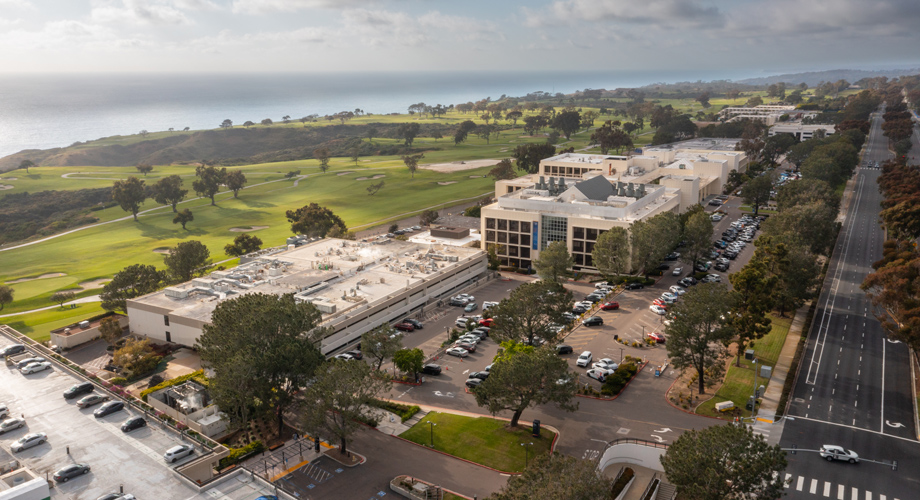
Nine new faculty join Scripps Research
The newly appointed faculty are making transformative discoveries in areas ranging across drug discovery, neuroscience, chemistry, immunity and more.
July 08, 2024
LA JOLLA, CA — Scripps Research is welcoming eight new scientists who bring their expertise to advance crucial discoveries in human health. They aim to make significant strides in areas including HIV, cancer, inflammatory bowel disease, autoimmune disorders and much more.
“This enormously talented group of scientists brings a diverse array of cutting-edge science to us that will further enrich our community,” says Peter Schultz, PhD, President and CEO of Scripps Research. “These appointments will lead to exciting collaborations and breakthroughs as we continue to push the frontiers of scientific discovery and innovation in medicine.”
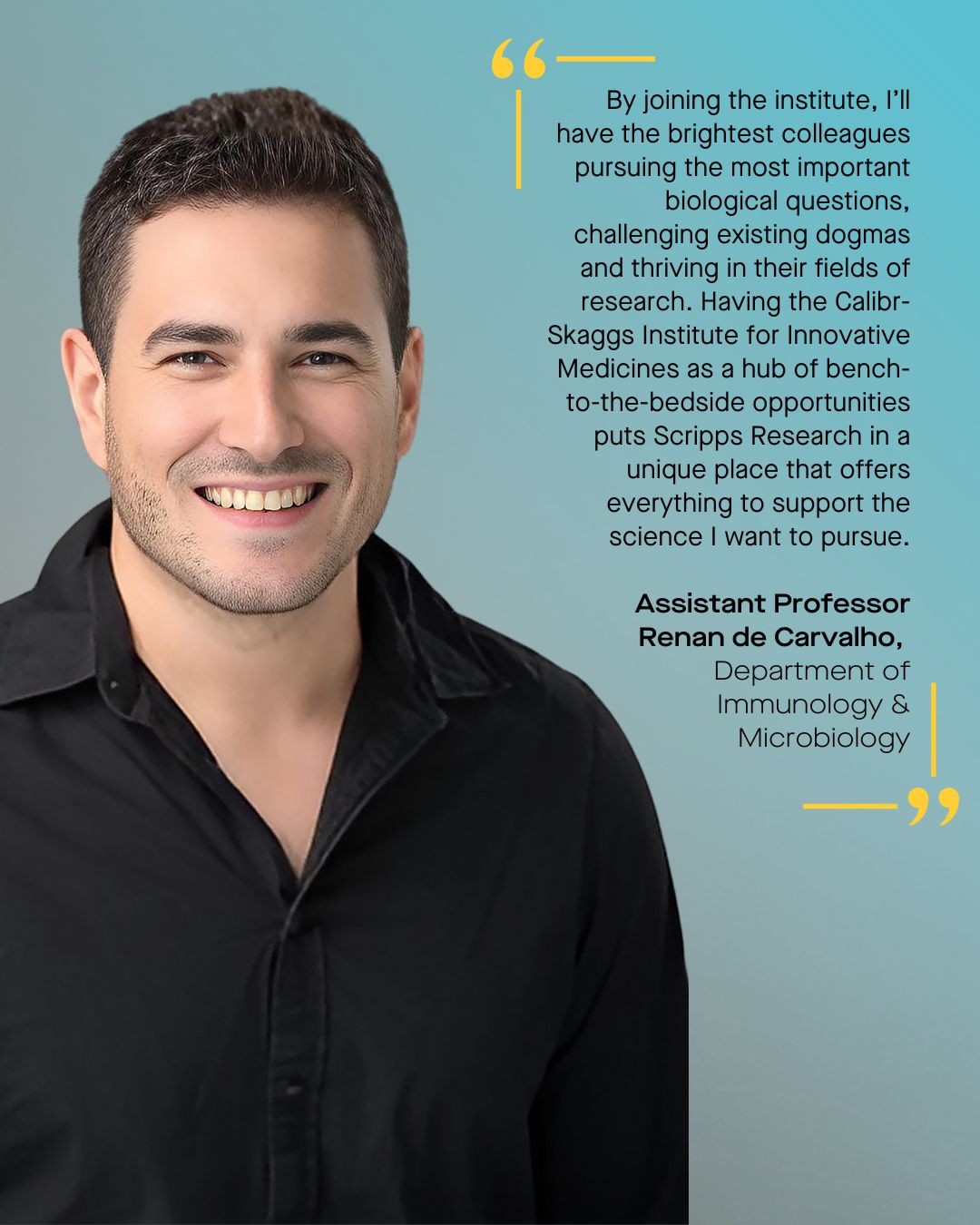 Renan V. H. de Carvalho, PhD – Immunology & Microbiology, Assistant Professor
Renan V. H. de Carvalho, PhD – Immunology & Microbiology, Assistant Professor
De Carvalho is revealing what factors promote long-lived immune responses. In particular, he studies an important component related to the immune system: plasma cells (PCs), the key antibody-producing machines in the body. PCs and antibodies give us protection against a wide variety of infectious diseases, and their induction is the goal of almost every vaccination strategy. Yet, scientists do not know what promotes plasma cell persistence and lingering antibody responses.
At Scripps Research, he aims to find the mechanisms that instruct certain PCs to become long-lived, knowledge which will address a major gap in the understanding of basic immunology. Knowing their longevity properties will ultimately allow manipulation of PCs not only to develop better vaccines against microorganisms and tumors, but also to avoid excessive inflammation and promote homeostasis.
De Carvalho comes to Scripps Research from The Rockefeller University, where, as a postdoctoral research fellow, he focused on longevity of B cell responses and germinal centers. Before that, he conducted doctoral and postdoctoral research at the University of Sao Paulo and received his bachelor’s degree from the Federal University of Juiz de Fora.
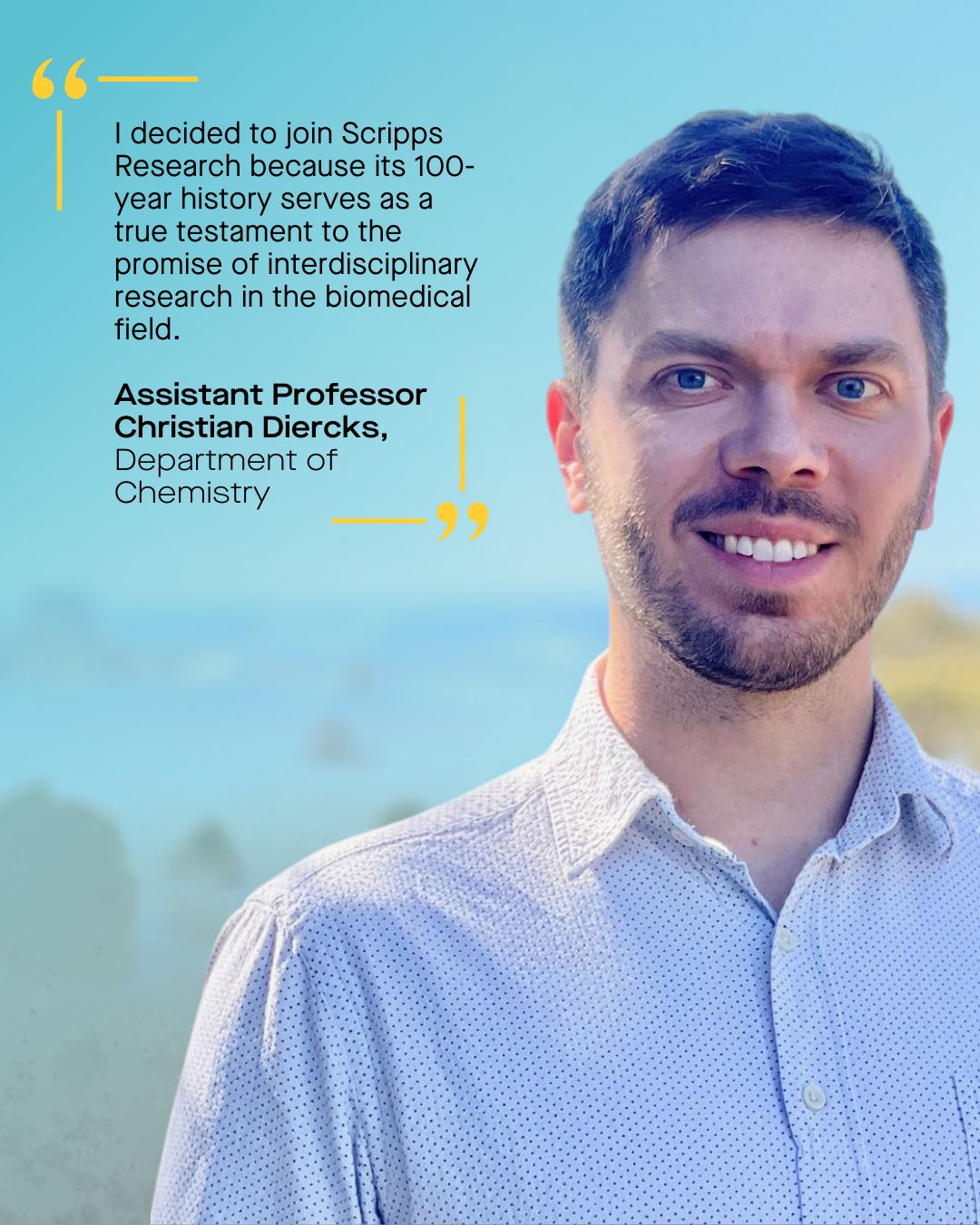 Christian Diercks, PhD – Chemistry, Assistant Professor
Christian Diercks, PhD – Chemistry, Assistant Professor
Diercks is leveraging his background in both materials chemistry and directed evolution to develop therapeutics and gene delivery vehicles that target specific cell types and tissues.
His lab at Scripps Research will develop systems for the directed evolution of biomacromolecules and nanostructured materials that can selectively target specific tissues, cell types or surface receptors. During his postdoctoral research in the Schultz lab at Scripps Research, he developed a system that accelerates natural evolution of specified genes by up to 100,000-fold. Now, he will use this system to rapidly evolve therapeutic proteins that selectively target or modify cancer-specific glycan determinants—sugar sequences on the surface of cells. Differences in these glycosylation patterns are not unique to disease but are also observed between different cell types or tissues of the body. Viruses have evolved to recognize such glycosylation patterns to infect specific cell types or tissues. He aims to target those differences and evolve specialized non-viral gene delivery vehicles for therapeutic applications.
Before his postdoctoral work at Scripps Research, he earned his PhD in Chemistry at the University of California, Berkeley and received his BS in Chemistry from the Ruprecht Karl University of Heidelberg.
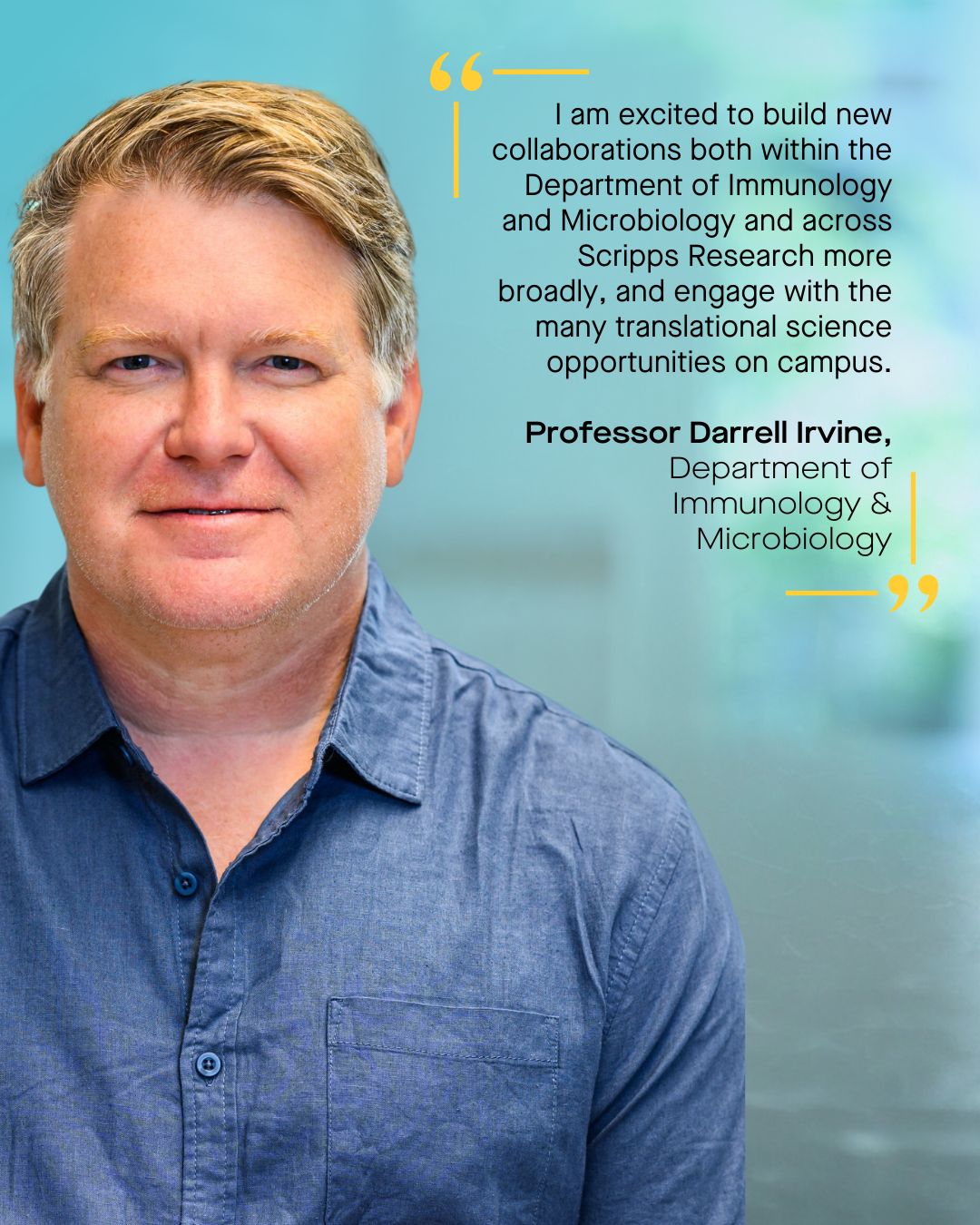 Darrell Irvine, PhD – Immunology & Microbiology, Professor
Darrell Irvine, PhD – Immunology & Microbiology, Professor
At Scripps Research, Irvine aims to collaborate across immunology, microbiology and other areas to engage with translational science opportunities, particularly around infectious disease and cancer. A major effort of his laboratory at Scripps Research will be directed toward vaccine development for HIV and cancer immunotherapy.
Engineering strategies directed toward problems in cellular immunology can lead to treatments for cancer, infectious diseases and autoimmune conditions. The Irvine lab aims to achieve this by integrating principles from immunology with biotechnology and materials chemistry. Specifically, he applies engineering principles to modulate and empower the immune system in the prevention and treatment of human diseases. For example, his lab is developing synthetic materials (smart materials and nanotechnology) to enhance vaccines against infectious disease and cancer, as well as materials that can help improve anti-tumor immune responses.
Irvine, who is a Howard Hughes Medical Institute Investigator, was previously a professor at MIT, where he also received his PhD. He received his undergraduate degree from the University of Pittsburg.
 Ann Kennedy, PhD – Neuroscience, Associate Professor
Ann Kennedy, PhD – Neuroscience, Associate Professor
Kennedy studies the underlying neuroscience and brain structures that give rise to fundamental behaviors related to fear, survival and social interactions. By better understanding the neural activities that guide our decision-making and behavior, her work aims to reveal insights about the guiding principles of behavior, as well as what happens in cases of dysfunctions—for example, social dysfunction or excessive fear and anxiety.
Her lab at Scripps Research will focus on how the brain learns, makes decisions and works toward goals. In particular, she researches how neural populations represent sensory and internal data by looking at various brain structures, such as the hypothalamus and its role in social and defensive behavior; the basal ganglia’s part in influencing certain behaviors; and the hippocampus’ activity related to social-bond formation. Using tools from dynamical systems, statistical modeling and machine learning, her lab will reveal key insights into flexible and adaptive behavior control.
Previously, she worked as an assistant professor at Northwestern University. Before that, she was a postdoctoral researcher in the David Anderson Research Group at Caltech. She received her PhD from Columbia University.
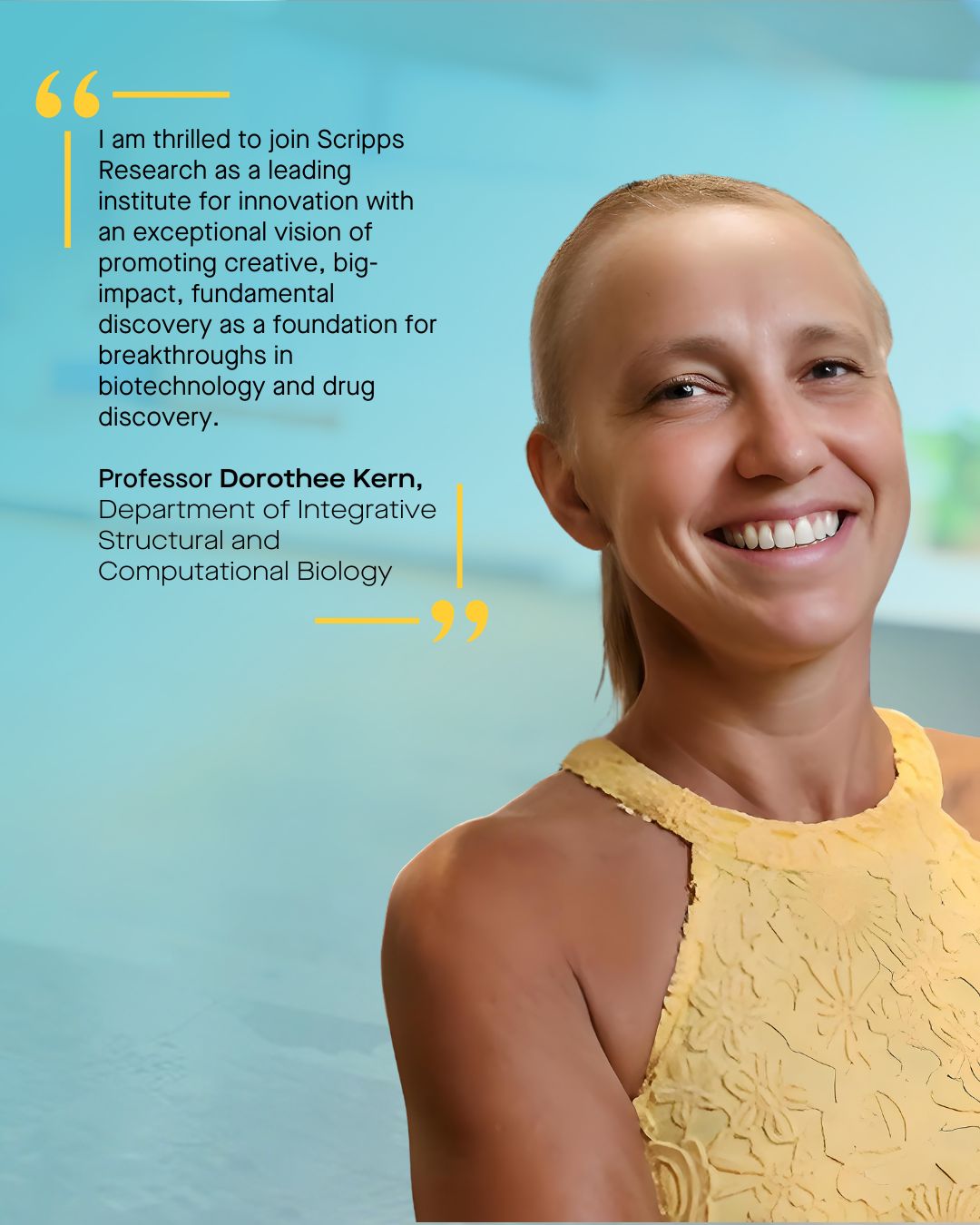 Dorothee Kern, PhD – Integrative Structural and Computational Biology, Professor
Dorothee Kern, PhD – Integrative Structural and Computational Biology, Professor
Kern’s work focuses on the protein dynamics at the heart of biology and rational drug design. Modern structural biology and recent advances in artificial intelligence have delivered static high-resolution proteins structures, but to understand their function, proteins need to be observed in action.
Kern has pioneered ways to unravel how such protein dynamics are controlling biological processes, ranging from enzyme catalysis to signaling to drug binding. Her team has developed a novel integrative approach that combines time-resolved biophysical experiments with computation to produce protein movies, visualizing the proteins’ choreographed dance at atomic resolution during their healthy natural function.
Kern also showed that differential protein dynamics in drug targets can be exploited for rational drug design to overcome drug side effects and drug resistance—major obstacles in cancer treatment. These results led her to center protein dynamics and allosteric networks at the heart of improved drug design. She founded two biotech companies based on these disruptive concepts, Relay Therapeutics and MOMA Therapeutics.
Kern joins Scripps Research as Investigator of the Howard Hughes Medical Institute. She previously worked a professor at Brandeis University and received her BS and MS in Biochemistry from the Martin Luther University in Halle, where she finished her PhD after the fall of the Berlin Wall.
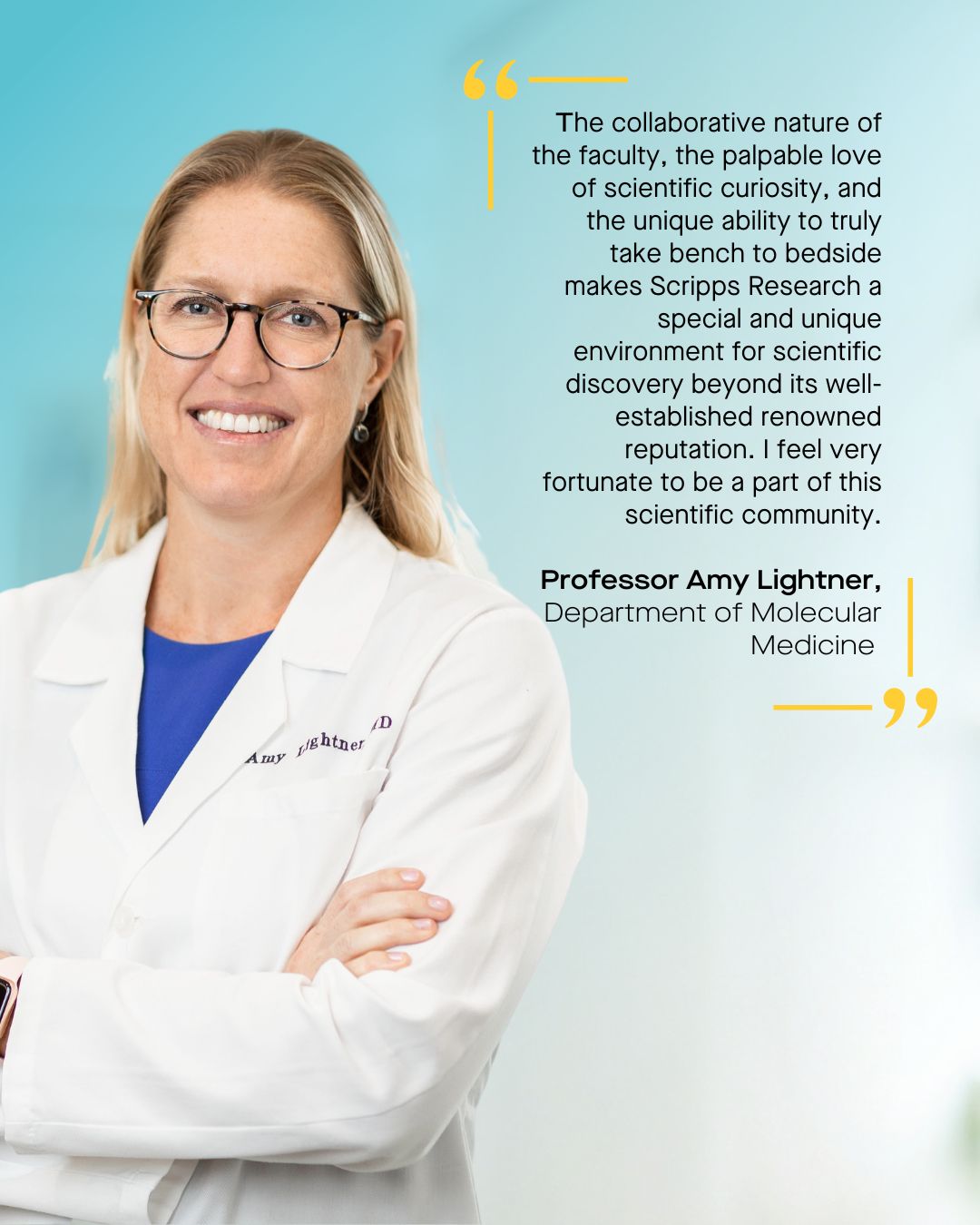 Amy Lightner, MD – Molecular Medicine, Professor
Amy Lightner, MD – Molecular Medicine, Professor
Lightner focuses on inflammatory bowel disease, which is on the rise globally, now affecting 1:100 in the United States alone. Despite decades of research, scientists still don't understand what causes inflammatory bowel disease. Treatment options remain limited, placating symptoms rather than curing the disease.
Lightner’s lab uses organoids derived from human tissues taken from surgical patients to study the cause of inflammatory bowel disease and discover potential novel therapeutics that focus on tissue regeneration and restoration. This serves as a model for drug discovery, both in her lab and across collaborations with other labs. Products from her lab are then studied in first-in-human clinical trials to establish and underscore safety in this patient population, with a goal of providing better, more effective treatment options, while simultaneously better understanding the underlying disease.
She is a colorectal surgeon at Scripps Clinic specializing in inflammatory bowel disease and has previously worked at the Cleveland Clinic and the Mayo Clinic Rochester. She received her MD from Boston University and completed her post doctorate fellowship and undergraduate degree from Stanford University.
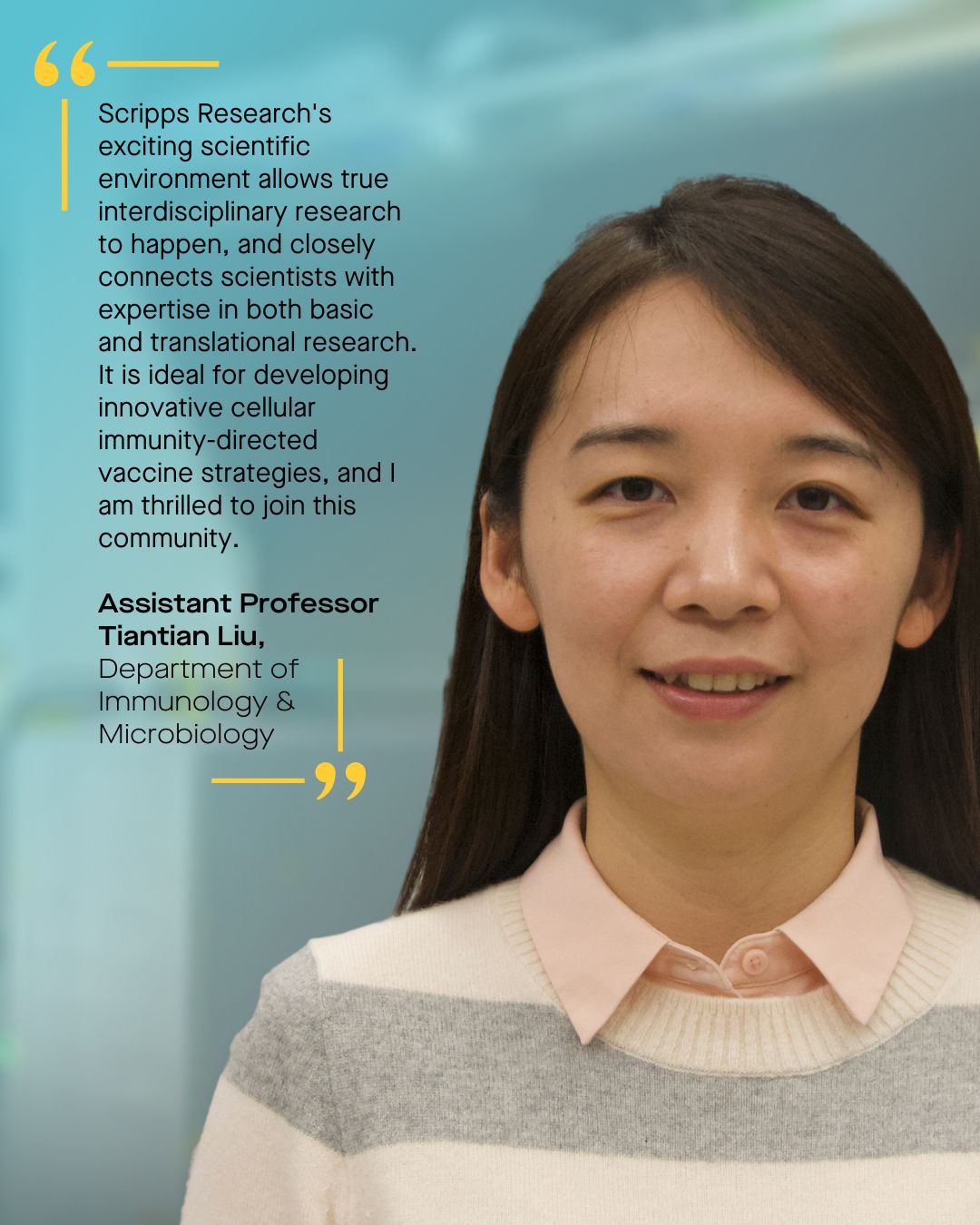 Tiantian Liu, PhD – Immunology & Microbiology, Assistant Professor
Tiantian Liu, PhD – Immunology & Microbiology, Assistant Professor
Cellular immunity plays an indispensable role in fighting against infectious diseases and cancers.
A wide variety of vaccines that induce potent antibody responses have been successfully developed, but how to develop vaccines for stimulating T-cell responses is still an unsolved question. Liu aims to address this problem by investigating the development and function of dendritic cells, a specialized immune cell type that plays essential roles in T-cell activation.
Her insights focus on dendritic cell biology, with the intent to translate these findings into clinical medicines, including anti-cancer dendritic cell vaccines.
Liu conducted her postdoctoral research in the laboratory of Kenneth Murphy at Washington University in St. Louis. While there, she developed new genetic tools to understand the transcriptional circuits that regulate dendritic cell development. Before that, Liu received a BS in Biology, and completed her PhD in Cell Biology from Wuhan University in the laboratory of Hongbing Shu, where she focused on signal transduction in anti-viral innate immunity.
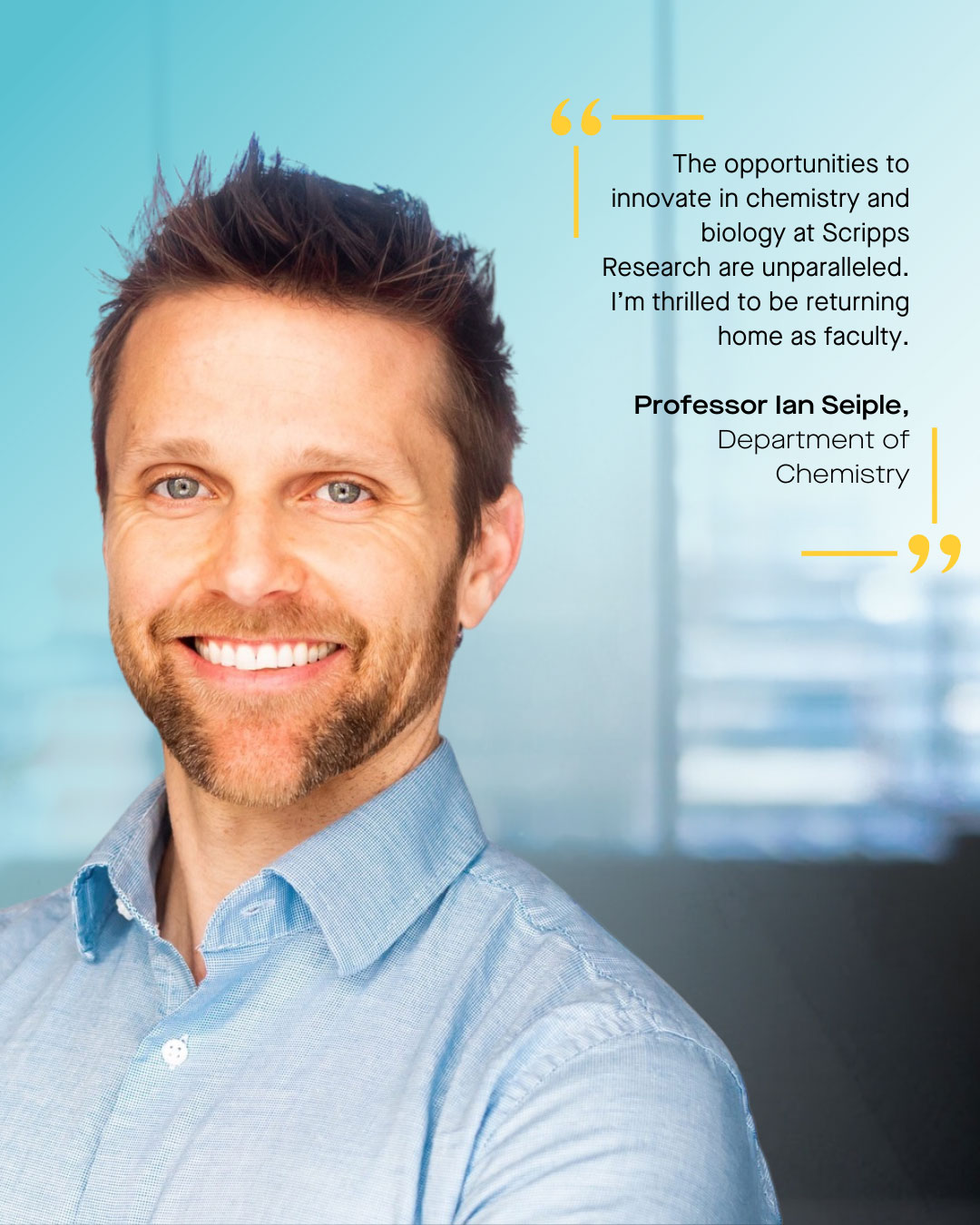 Ian Seiple, PhD – Chemistry, Professor
Ian Seiple, PhD – Chemistry, Professor
Seiple develops modular, fully synthetic routes to complex molecules that have the potential to impact medicine and biology. Many of these efforts are focused on the synthesis of antibiotics, an area of unmet need due to the continuous increase of antimicrobial resistance worldwide. Additionally, he uses chemistry to develop new tools to study biological systems.
At Scripps Research, Seiple plans to synthesize molecules with increasing diversity and complexity, expanding the scope to disease areas such as cancer and aging. Such endeavors will be fueled by interdisciplinary collaborations in chemical biology, structural biology and microbiology.
Seiple, who earned his PhD from Scripps Research, returns to the institute from the University of California, San Francisco, where he was an associate professor. He completed his postdoctoral studies at Harvard University and received a BS in Chemistry from the University of California, Berkeley.
 Meng Zhang, PhD – Molecular & Cellular Biology, Assistant Professor
Meng Zhang, PhD – Molecular & Cellular Biology, Assistant Professor
Zhang focuses on developing new tools that will deepen our understanding of how tissues function at a molecular and single-cell resolution.
In particular, she will focus on the development of spatial multi-omics tools that allow for genomic-scale profiling of cells in tissues at single-cell resolution. By exploring how different cell types organize and communicate within tissues, and by monitoring dynamic cellular changes through the development of a platform that bridges live-cell imaging and genomic-scale molecular profiling in tissues, her lab hopes to uncover the fundamental mechanisms that enable tissues to function as cohesive units. This research holds significant potential for advancing knowledge of tissue development, disease progression and precision medicine.
Zhang comes to Scripps Research from Harvard University’s Department of Chemistry and Chemical Biology, where she was a postdoctoral fellow. Before, she was at Ohio State University, where she received her PhD.
For more information, contact press@scripps.edu

